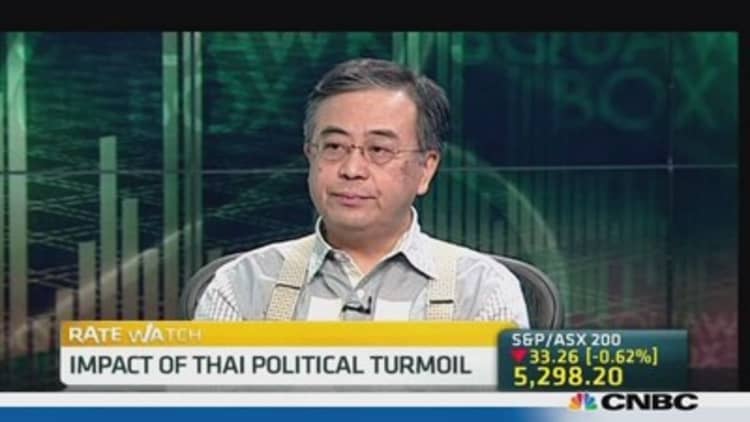
The Bank of Thailand's surprise move to keep interest rates steady rather than cutting could indicate the central bank has hit the limits of monetary policy amid continued political protests.
"The majority view of four members saw that the political gridlock could not be addressed by more accommodative monetary policy," Roong Mallikamas, spokesperson for the Bank of Thailand, told CNBC on Thursday.
"Political uncertainty would likely cause delays in fiscal spending and dent private sector confidence," she said. "Even if the export sector looked to improve on the back of strengthening global demand, it would likely not be enough to compensate for the weaker domestic demand."
(Read more: Thai market may muddle through state of emergency)

The central bank's monetary policy committee voted four-to-three to keep rates on hold at 2.25 percent on Wednesday, compared with a consensus expectation for a 25 basis point rate cut to help counter slowing growth as political protests continue to disrupt the economy.
Despite the split vote, Roong noted all of the committee members share the same view on the economic outlook. The Bank of Thailand downgraded its expectations for 2013's gross domestic product (GDP) from around 3 percent growth to less than 3 percent, and lowered its view on 2014 growth to around 3 percent from 4 percent.
(Read more: Has Thailand's government survived the gauntlet?)
Thailand's economy was already slowing before anti-government political protests began in late October, hurt in part by funds flowing out of the region after the U.S. Federal Reserve in May first broached the possibility it would begin tapering its asset purchases.
Analysts' expectations that the central bank would act may have been thwarted, but they expect this is just a rate cut delayed, not a rate cut denied.
"The longer the political crisis drags on, the greater will be its impact on the economy," Krystal Tan, an Asia economist at Capital Economics, said in a note. "A prolonged standoff could disrupt the roll-out of key public infrastructure projects and cause further damage to the important tourism industry. Given that a caretaker government faces spending restrictions, the pressure is on the Bank of Thailand to prop up demand."
(Read more: Thai unrest casts doubt on investment expansions)
Others also expect the central bank will be forced to act.
"The central bank will eventually be compelled to use up what little ammunition it has left in the coming months, and cut its policy rate by another two times (of 25bps each) before the first half of the year is up," HSBC said in a note. "There is no real end game in sight, given the February 2 elections may not appease the opposition and protesting groups."
In response to a spate of protest-related violence over the weekend which killed at least one and wounded dozens, some seriously, the government declared a 60-day state of emergency in Bangkok and surrounding provinces late Tuesday, allowing security agencies powers including enforcing curfews, detaining suspects without charges and preventing large political gatherings.
(Read more: We don't mind if we lose 'fair elections': Abhisit)
While so far the government has avoided strictly enforcing these measures, how the powers are used is being closely watched as a potential flashpoint for intensifying protests.
The street protests are calling for Prime Minister Yingluck Shinawatra to step down and to replace their country's democracy with an unelected "people's council" for an undefined period of time.
In early December, Yingluck called a snap election in an unsuccessful effort to defuse protests. Since then, the main opposition, the Democrat party, has said it will boycott the election and protesters have prevented candidates from registering. The Election Commission is seeking the approval of the Constitutional Court to delay the elections.
—By CNBC.Com's Leslie Shaffer; Follow her on Twitter @LeslieShaffer1

